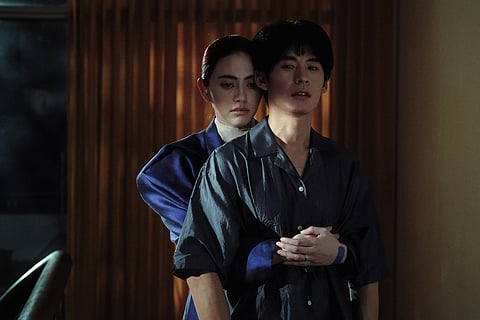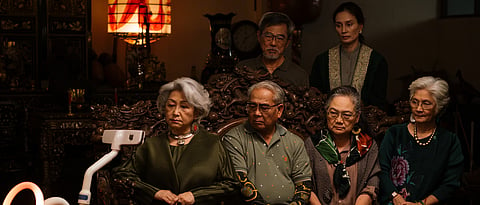There are many kinds of ghosts in Ratchapoom Boonbunchachoke’s witty, cheeky A Useful Ghost. They range from avenging and embittered to pleasant, generous and helpful. The film makes a plea for ghosts not as rude interruptions but aiding presence who, however, might upset plans. When an ‘academic ladyboy’ (Wisarut Homhuan) has his vacuum cleaner acting up, coughing, he’s rattled. The repairman Krong (Wanlop Rungkumjud) arrives, bearing a string of stories around the haunted appliance. Beneath this frame narrative lies nestled a progressively wacky, deliriously charming concoction of events.
Cannes 2025 | A Useful Ghost Review: Beguiling Thai Yarn Of Haunted Objects and Pasts
Ratchapoom Boonbunchachoke’s debut takes an outlandish human-vacuum cleaner romance in playful, slyly political directions
A family saga, threaded to the factory wherefrom the appliance came, rolls out. Suman (Apasiri Nitibhon), who now runs the factory after her husband’s death, is distraught over her persistently depressed son March (Witsarut Himmarat). He’s grappling with his wife Nat’s ( Davika Hoorne, walking an exquisite tight rope between the placid and emotional ripples) death. When she returns as a ghost occupying a vacuum cleaner, he’s overjoyed. But his family is concerned, cynical of Nat’s re-entry in his life.

Nat insists she’s not a vengeful ghost, that she means well for March and the family. But bolstered by the larger family, relatives, Suman is unwilling to let Nat’s return pass as a domestic rite. Suman is beleaguered, attacked by the elders on account of both her children. One is gay, the other besotted with his dead wife’s lingering ghost. Already weary of dealing with a closed factory’s repercussions, Suman finds herself pressed on to intervene, be sterner in the case of March and Nat. If she doesn’t, her passivity would be further arrogated to her maternal incompetence, that she has wholly failed. The family rails against March and Nat’s bizarre reunion, insisting on the immorality of human-ghost togetherness.

Boonbunchachoke weaves the film with a storyteller’s ardent love for his strange, whimsical, recklessly playful saga. The most exaggerated, seemingly ludicrous circumstances play out with matter-of-fact sincerity. When a vacuum cleaner possessed by a ghost shows up at a hospital pleading entry to its husband’s room, the receptionist insists it stick to visiting rules. She complains even dead people have husbands they need to attend to, whereas she, despite being alive, can’t even find a partner. She exhibits no surprise or alarm at the weirdly animated, speaking cleaner. One of the funniest scenes, delivered deadpan, has Suman chiding March to “stop screwing the vacuum cleaner”. Another scene guaranteed to leave the viewer in splits is a group of monks aghast at discovering March making out with the appliance.

In delightful ways that pay homage to as well as parody the strong Thai horror tradition, A Useful Ghost swerves away from grotesque, eerie terror to reflect more humane, wistful enquiries into spirits caught in a limbo of melancholy and longing. DP Pasit Tandaechanurat and production designer Rasiguet Sookkarn establish a rich, graceful visual schema that shuttles between austere spaces and jolting vibrant disruptions.
There’s a rich vein of absurdity shot through with an impulse to make light of the gathering grief at its center. At some point in the film, a character asserts ghosts come back for two reasons. One, when they remember; the second, when they are remembered. Love becomes central to this proposition. Dead people who stubbornly hang on to their beloved, so do the latter until the inevitable rupture exerts itself; can the memory of love slice through mortality’s abscesses? With time, March’s memory of the Nat he used to know and love before she died, fades.
In the film, remembrance, erasure of memory are also tapped for their political charge. Moving from the private to public, holding onto memories of vicious injustice and violence are defiant acts, pushing back regimes and authorities that seek to deny, wipe them from the records. Nat becomes weaponized, a mere plaything to be manipulated by the powerful. While alive, she had been unhappy, chafing at tensions produced by March’s family. She hadn’t been gladly accepted into its folds, viewed instead with antipathy and distaste. March’s extended family is spectacularly cold, dismissive and intolerant of his fixation with Nat’s ghost. Even after death, she has to struggle with earning a place, their trust and warmth. The film ventures into dream surveillance, with not even ghosts being spared—they’re used to further the agenda of the political elite, whitewash their historic sins. Workers remain milled under, their rights dismissed as fanciful. The specter of the 2010 Thai military crackdown drapes the film's gradual events. As Nat becomes absorbed in this project, she drifts far from who she used to be while she was alive. It’s only a matter of time before she too becomes just a wisp, disappearing into the thin air.

Admittedly, the outer narrative comes off as slight and doesn’t cohere into the interlocking embedded story as fluidly. Even the conclusion of Nat-March’s romance feels a tad predictable, rendering the emotional payoff considerably diminished. But these don’t detract at all from the sparkling imagination and arresting humor on display throughout A Useful Ghost. It’s an impish, wondrous debut that collapses into familiarity as it winds up but has enough eccentricity to let us stay the course. There are many marvelous pleasures here.
A Useful Ghost premiered in Critics’ Week at Cannes 2025.
Tags
